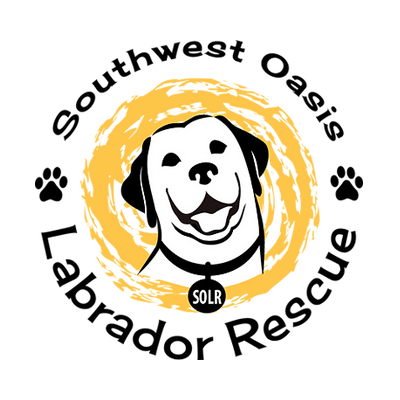Regarding Fostering our Labs
All foster dogs must stay a minimum of five days in foster before becoming available for adoption. Most foster dogs are with their fosters for two to four weeks.
In some instances, a foster dog may be with you for several months, depending on the dog’s needs, such as behavioral or medical.
Providing frequent updates, high-quality photos, and details about the fun things you are learning about your foster dog will help them get adopted more quickly!
A list of supplies that you will need for your new foster friend includes:
SOLR does not reimburse foster families for food, toys, supplies, or damage that might be caused by the dog.
Yes, all vet care, including medication and prescription food, is paid for by SOLR. You are expected to transport your foster dog to the vet SOLR uses.
While the Medical Team will work with your schedule to arrange vet appointments, our vets often have limited availability and cannot always accommodate preferences.
Some of our foster dogs have experienced a great deal of stress by the time they reach your doorstep. They may have been in a situation where they were ignored, tied outside, played with too roughly, reprimanded loudly, or never trained at all. They may have been strays who had been without food or water for a period. In short, they may be unsettled when they first arrive.
If you have any questions or concerns, contact your Foster Mentor.
Let the Foster Team know as soon as you know about a vacation or personal matter, even if you think your foster dog will get adopted by then. The sooner the Foster Team knows, the easier it is for them to find a short-term or alternate foster. If an emergency arises, we have boarding options available until we find a new foster.
While SOLR tries to arrange for the dog’s spay/neuter prior to it arriving to your foster home, that is not always possible. If they have not been altered prior to arriving to your home, they will be spayed/neutered prior to adoption.
The Medical Team will work with you to arrange a time and place for the procedure.
Yes, it is totally possible! Many of our fosters have cats and successfully foster dogs for us.
However, we may not know whether a dog in need is cat-friendly, so you need to ensure you can separate your cats and foster dog when we don't know yet if they're cat-friendly.
If your cats are given free reign of the entire home, you will need to foster only those dogs we know are good with cats.
SOLR allows fosters to adopt their foster dog after they've successfully fostered and adopted out two dogs previously. In other words, you may adopt your third foster dog.
The Foster Team puts a lot of time and resources into training new fosters, so we would like each foster to help at least three dogs.
SOLR does not offer foster-to-adopt, as it often causes great stress on the dogs and results in lower success rates.
SOLR hosts multiple events throughout the year. You and/or your foster Lab are encouraged to attend when possible. Events offer a great opportunity for your foster dog to meet potential adopters, as many approved adopters attend these events.
If you attend with your foster dog, you can show the dog yourself so that anyone interested in adopting him/her can ask questions of the person who knows the dog the best.
No, dog parks are very unpredictable and have an increased risk of your foster dog contracting a disease.
We would love for your foster dog to be included on such exciting trips outdoors!
Just make sure you've given your foster dog time to decompress before introducing it to new environments. It will give you time to determine if your foster dog would enjoy such activities.
SOLR requires that foster dogs remain on leash whenever outside the confines of your enclosed yard and home. Please make sure they have their SOLR tag on their collar!
Most dogs will need some basic training (like sit, down, household manners, and so forth), so fosters should start working with foster dog on basic obedience, which helps make them more adoptable.
However, the adopter bears the responsibility of training the dog to the standard the adopter expects.
Some dogs come to us with behavioral issues that require training prior to adoption. In that case, SOLR will schedule and pay for training with one of its partnered trainers.
All applicants are screened and have a home inspection before being approved to begin meeting Labs available for adoption. Approved adopters receive the Paw Print, an email listing of available dogs and foster contact information, on Tuesday and Friday.
When the adopter calls, carefully review their application and the home visit notes. Share as much as you can about the dog with the potential adopter clarifying any inconsistent information as well as characteristics of the dog that don’t match their preferences. If it seems like a good match, arrange a time for the approved adopter to come to your home to meet your foster dog. Remember, just because an adopter is approved with SOLR does not mean they are a good match for your specific foster dog.
SOLR strongly recommends meets to occur at the prospective adopter’s home. During the visit, the entire adoptive family, human and canine, is expected to attend. If they come to your house, remember you are not hosting a social event. Instead, you are trying to ensure this is the right fit for your foster dog. Please leave your own dogs in a separate room so the focus will be on the foster dog. SOLR suggests a 24-hour waiting period for both the potential adopter and the foster to decide if this is the best match for the dog and family.
Please sign up for our newsletter to get updates on our rescue, our dogs and events.
